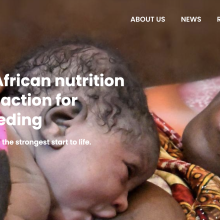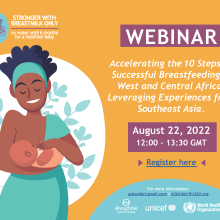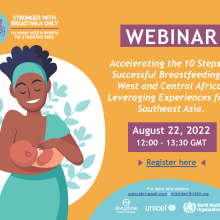Journal article
Oct 06 2022

“Stronger With Breastmilk Only” Initiative: Evaluation in Four Countries in West and Central Africa and at Regional level
The Stronger With Breastmilk Only initiative has successfully set or reset the agenda of governments and partners on the work on breastfeeding - but the process of implementing the initiative and all the strategies su
Announcement
Sep 18 2022

Stronger With Breastmilk Only website
Breastmilkonly.com, the online home of the Stronger With Breastmilk Only regional initiative, has been redesigned, in collaboration with UNICEF and WHO.
Journal article
Sep 01 2022

Implementation and Effectiveness of Policies Adopted to Enable Breastfeeding in the Philippines Are Limited by Structural and Individual Barriers
The Philippines has adopted policies to protect, promote, and support breastfeeding on par with global standards, yet the impact of these policies is not well understood.
Presentation, Video
Aug 26 2022

Accelerating the 10 Steps to Successful Breastfeeding in West and Central Africa: Leveraging Experiences from Southeast Asia
In August 2022, UNICEF, WHO, Irish Aid and Alive & Thrive's offices in West Africa and Southeast Asia collabor
Announcement
Aug 01 2022

WEBINAR: Accelerating the 10 Steps to Successful Breastfeeding in West and Central Africa. Leveraging Experiences from Southeast Asia
The Stronger with Breastmilk Only regional initiative, a collaboration of UNICEF, WHO and Alive & Thrive, is pleased to invite stakeholders to a 90-minute webinar on August 22 at 12:00 GMT to discuss how to accelera
Journal article
Jul 27 2022


